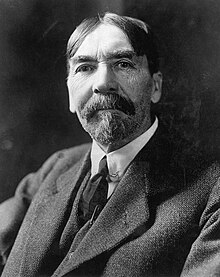
Back ثورستين فيبلين Arabic ثورستين فيبلين ARZ Torsteyn Veblen Azerbaijani Торстэйн Веблен Byelorussian Thorstein Veblen Catalan Thorstein Veblen Czech Thorstein Veblen Welsh Thorstein Veblen Danish Thorstein Veblen German Θορστάιν Βέμπλεν Greek
Thorstein Veblen | |
|---|---|
 | |
| Born | Thorstein Bunde Veblen July 30, 1857 Cato, Wisconsin, U.S. |
| Died | August 3, 1929 (aged 72) Menlo Park, California, U.S. |
| Academic career | |
| Field | Economics, socioeconomics |
| Institutions | |
| School or tradition | Institutional economics |
| Alma mater | |
| Influences | Herbert Spencer, Thomas Paine, William Graham Sumner, Lester F. Ward, William James, Georges Vacher de Lapouge, Edward Bellamy, John Dewey, Gustav von Schmoller, John Bates Clark, Henri de Saint-Simon, Charles Fourier |
| Contributions | Conspicuous consumption, conspicuous leisure, trained incapacity, Veblenian dichotomy |
| Part of a series on |
| Capitalism |
|---|
| Part of a series on |
| Economics |
|---|
 |
Thorstein Bunde Veblen (July 30, 1857 – August 3, 1929) was an American economist and sociologist who, during his lifetime, emerged as a well-known critic of capitalism.
In his best-known book, The Theory of the Leisure Class (1899), Veblen coined the concepts of conspicuous consumption and conspicuous leisure. Veblen laid the foundation for the perspective of the institutional economics. Contemporary economists still theorize Veblen's distinction between "institutions" and "technology", known as the Veblenian dichotomy.
As a leading intellectual of the Progressive Era in the US, Veblen attacked production for profit. His emphasis on conspicuous consumption greatly influenced economists who engaged in non-Marxist critiques of fascism, capitalism, and technological determinism.